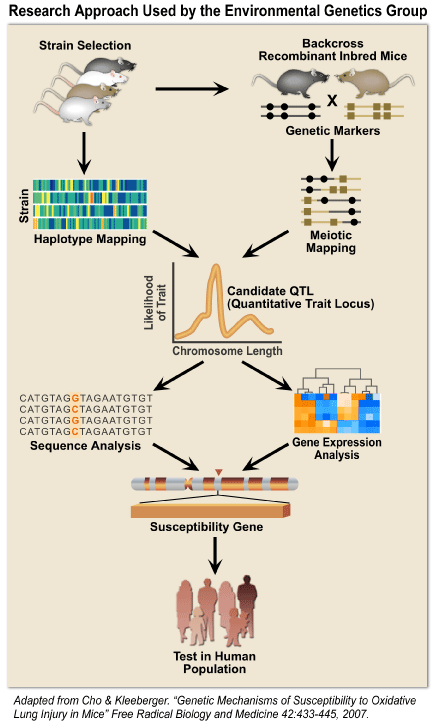 |
|
Genetic Susceptibility in Lung Disease Steven Kleeberger, Ph.D.
Principal Investigator Tel (919) 541-3540 Fax (919) 541-4133 kleeber1@niehs.nih.gov P.O. Box 12233 Mail Drop D2-01 Research Triangle Park, North Carolina 27709 Delivery Instructions Research SummaryThe Environmental Genetics Group uses state-of-the-art methods in inhalation toxicology, pulmonary physiology and molecular genetics to study the role of genetics background as a susceptibility factor in environmental lung disease. Epidemiological studies have associated exposures to outdoor and indoor pollutants with increased morbidity and mortality in urban cities throughout the U.S. and other industrialized countries. Because of the potential impact that pollutants may have on public health, identification of the intrinsic and extrinsic factors that influence susceptibility to the pulmonary response(s) to exposures is an important issue. 
The Environmental Genetics Group has identified quantitative trait loci (QTL) for susceptibility to the inflammatory responses to ozone, sulfate-associated particles and hyperoxia. Candidate genes for the QTLs have been identified, and functional analyses have confirmed important roles for each. The group believes that investigation of the mechanisms of genetic susceptibility will have important implications for understanding the pathogenesis of environmental lung diseases. Applying in vivo and in vitro findings in translational investigations to human populations have provided unique insight into disease mechanisms. Major areas of research:
Current projects:
Steven R. Kleeberger, Ph.D., head of the Environmental Genetics Group, earned his A.B. in zoology at Miami University in Oxford, Ohio, and his Ph.D. in ecology and environmental physiology at Kent State University in Kent, Ohio. He holds several Adjunct Professorships: Environmental Health Sciences, Johns Hopkins University; Medicine, Duke University; Pediatrics and Curriculum in Toxicology, University of North Carolina at Chapel Hill. He has published over 110 peer-reviewed articles in leading biomedical journals as well as two dozen book chapters and invited reviews. Kleeberger was a professor of environmental health sciences at the Johns Hopkins Bloomberg School of Public Health before joining NIEHS in 2002. He is a reviewer for over 20 journals, and he has held a number of editorial board positions, including ones on Pharmacogenetics and The American Journal of Respiratory and Critical Care Medicine. He has given over 90 invited lectures in the United States, Europe, Asia and South America. He has been president of the Inhalation Specialty Section of the Society of Toxicology, and has also served or currently serves on multiple study sections at the National Institutes of Health, international advisory committees on genetic susceptibility and the Clean Air Scientific Advisory Committee (CASAC) Review Panel. |
|

